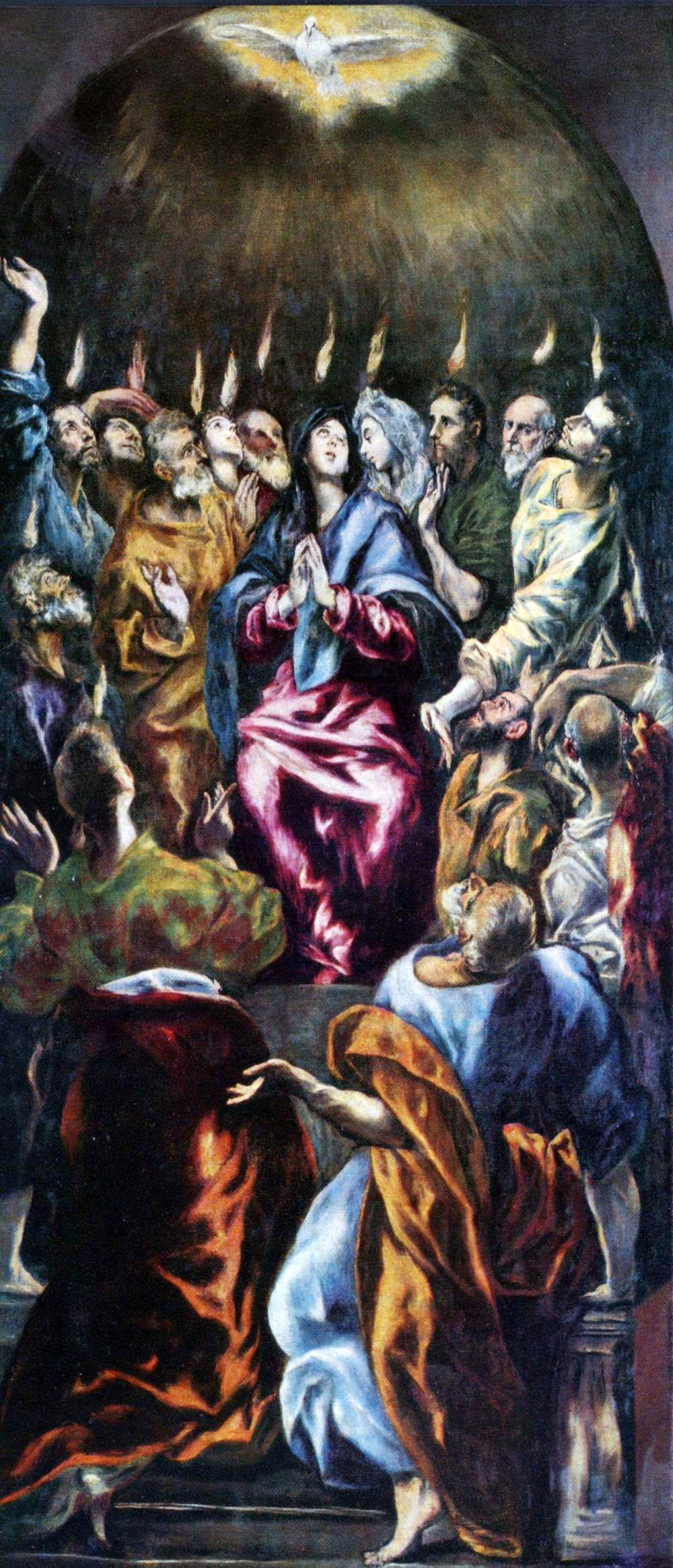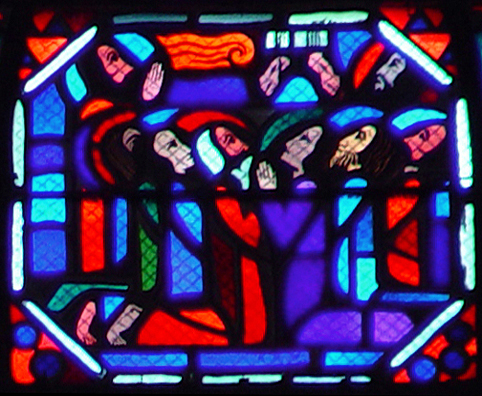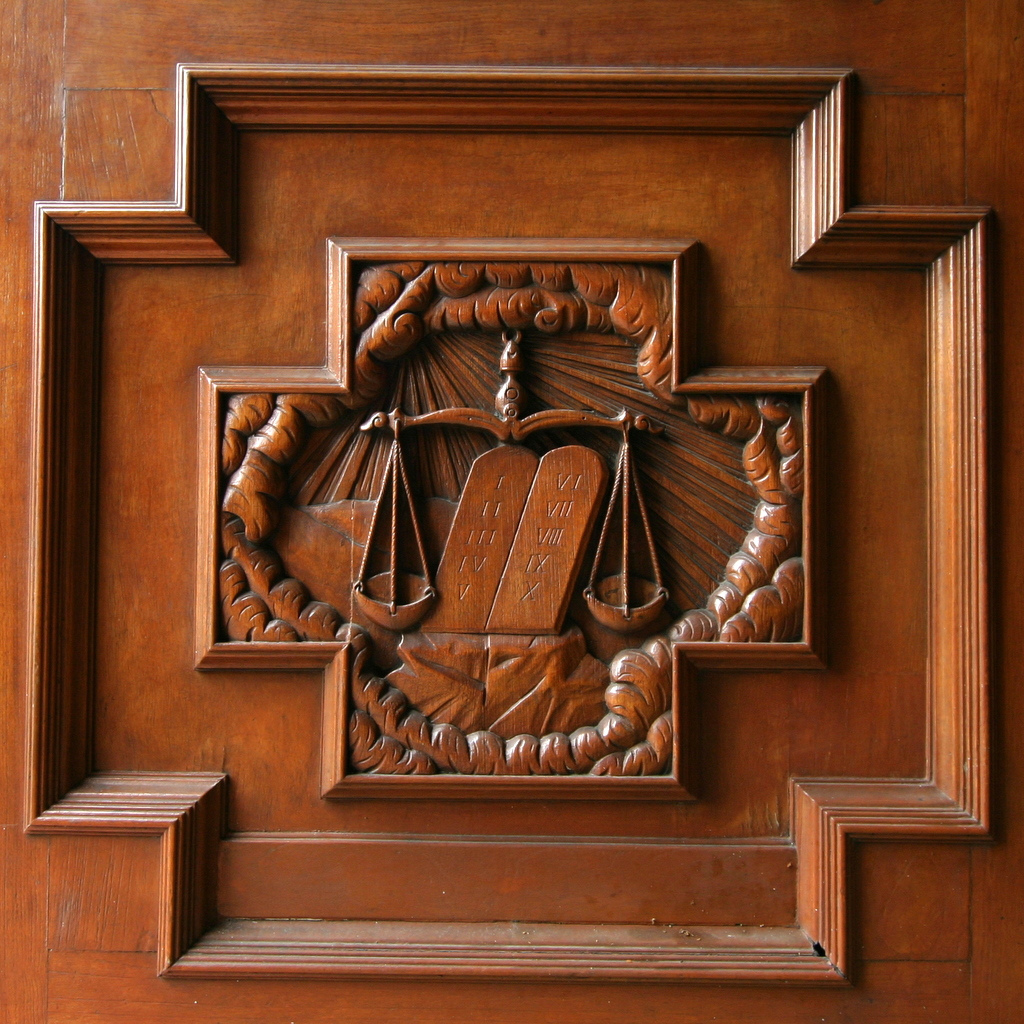Read Romans 8:22-27
Read Acts 2:1-21
 |
| Image Courtesy of Vanderbilt Divinity Library |
Today in the life of the Church we celebrate the day of
Pentecost. It is the amazing day in which the Holy Spirit descended like
tongues of fire upon a group of early followers. Although these followers were
from different areas and spoke different languages, through the spirit they
began to understand what the others were saying as if they were speaking their
own native tongue. This event was so powerful that after it 3,000 members were
baptized and joined the church that day. For this reason Pentecost is often
referred to as the birthday of the Church. This makes sense, after all Jesus
had just ascended 10 days earlier, the disciples had just elected a new 12th
disciple, but still there were questions of leadership, authority, and an
overall feeling of what now? Jesus is
gone, what do we do now? The Spirit’s
presence with the people answered these questions; God’s presence was still
with them, and they could continue their ministries in the world through the
guidance of the Spirit. With this new hope and guidance and with the 3000
members that joined that day, it no wonder why this day is celebrated as the
birthday of the (big C) Church.
But although Pentecost is rightfully celebrated as the
birthday of the Church, it is really only a labor pang of the Kingdom of God.
As our scripture from Romans says, “We know that the
whole creation has been groaning in labor pains until now; and not only the
creation, but we ourselves, who have the first fruits of the Spirit, groan
inwardly while we wait for adoption, the redemption of our bodies.” While
Pentecost is a significant celebration of the glory of God, too often churches
today look back at that earliest Church as say, “If only we could be like the
original Church.” But this Church at Pentecost is not the goal to be desired,
it is instead more like an announcement of what is to come. In Revelation 7,
John of Patmos reveals to us a picture of what the Kingdom in all of its glory
will be like. He says, “After this I looked, and there
before me was a great multitude that no one could count, from every nation,
tribe, people and language, standing before the throne and before the Lamb.
They were wearing white robes and were holding palm branches in their hands.
And they cried out in a loud voice: “Salvation belongs to our God, who sits on
the throne, and to the Lamb.” Revelation tells us of the Kingdom of God
in its fullest as a time where all peoples from all nations would be gathered
in praise of Jesus Christ. It even goes on to say that “God will wipe every tear from their eyes”.
As we look back to that day of Pentecost, it is obvious
that this day is not the coming of the Kingdom in its fullest. It is however, a
day that that with hope points towards the coming of the Kingdom in all of its
glory. In a way, Pentecost is an announcement to the world; not only that the
Kingdom of God is coming, but that the Kingdom is here. As we heard earlier
from Romans, Paul equates the time we are in now to a time of labor pains
before the Kingdom of God is fully birthed. While the celebration of Pentecost
is a celebration of the Church’s birthday, not that of the Kingdom of God, it
is still something that calls for celebration.
For years, probably even centuries we as a culture have
been great at celebrating birthdays. Kids gather around lit candles on a cake
just waiting to blow them out and make a wish. We give gifts and cards to
people on their birthday, or gather as family and friends for a meal. Even here
in the church we sing “Happy Birthday” to those who are celebrating in the
upcoming week. With the advances in technology a new sort of tradition has
begun, and that is the celebration of the announcement. For those who are on
Facebook you have most likely seen what I am talking about. Usually a couple
will take some sort of creative picture to tell to the world that they are
expecting a child. My favorite one was probably my boss from college who was
expecting around Christmas, so announced with a picture of a Christmas tree
saying “We are expecting a special gift under the tree this Christmas,” or
something along those lines. These celebrations are important. No longer do we
just celebrate a babies, arrive, but now we also celebrate the hope of their
arrival.
Pentecost is very similar to this type of announcement
celebration. As the Spirit descended upon the people gathered there allowing
them to speak to and understand each other, hope for the Kingdom of God in its
fullest was proclaimed. But let us not fall into the trap of thinking the
Kingdom of God is only something far away in the future. Pentecost is a
celebration that the Kingdom is here, now. Though it has not arrived in its
fullest, it is not the way it will ultimately be; it is here and here to stay.
When a couple announces they are pregnant, the child has not arrived, but in a
way it has. In the womb there is a child, growing each day. It is not just some
false hope of one day we will have a child, the child already exists and awaits
it day of birth. Likewise Pentecost is not a day of false hope, but one that declares
that the Kingdom is here, it exists, and will one day that New Creation will be
birthed.
It is no surprise that this day of Pentecost brings us so
much hope. Not only do the earliest followers receive the comfort from the
Spirit knowing that God has not abandoned them, but Pentecost is in itself a
small glimpse, a microcosm of the Kingdom in its fullest. Whereas we heard all
nations and tribes and languages gathered around the throne, here on Pentecost
we at least get a taste of that. On Pentecost we have not all, but a collection
of people from different tribes, and languages, and nations, all celebrating
together the glory of God. Their differences do not hinder the celebration as
it had ever since the Tower of Babel, but instead these differences now further
glorify God and show that Christ truly is Lord of All. At Pentecost we see the
hope of the Kingdom in its fullest, lived out on a smaller scale; a sign that
the Kingdom is already here.
Pentecost also reminds us that because the Holy Spirit is
with us, we too can catch glimpses of the future glory of the Kingdom. Last
week I mentioned that for me one of these times was at Seth Mokitimi Seminary
in South Africa. As me and a few fellow classmates from Duke served and studied
there for a summer, we would gather each morning in the chapel for Worship. We
as Americans were able to Worship with people from South Africa and surrounding
countries such as Zimbabwe and Mozambique, as well as other students from
England. This experience was more than just worshipping with people from
different countries however, for South Africa is very different culturally than
the U.S. In South Africa there are
different tribes such as Zulu and Xhosa and many more, descents of the English
colonizers, as well as Dutch descendants known at Afrikaners. In South Africa
there is no official langue like English is here, but isn’t there are 12
official languages of these diverse groups and many more that are unofficial.
These groups are separated by more than just their different languages, they
are also separated by a difficult past. The Afrikaners and English both colonized
the tribes of South Africa, and also fought against each other in the Boer War.
While this was happening tribes fought against tribe and some sold others into
slavery. Later in 1948 unjust system of law called the Apartheid was put into
place, forcing the blacks out of cities and towns and into the rural areas and
what are called townships, which are often poor shanty towns outside of the
cities. These people were oppressed, given no rights and often arrested or
killed. This lasted until 1994, only 17 years before my trip.
This history and diversity is what made worshipping
together so powerful. We truly gathered as different nations, tribes and
languages, and worshipped Christ. One of the most powerful aspects of the
service was when we would sing hymns; there would be a blend of both
traditional Western hymns as well as some of the tribal worship hymns. As we
sang we would also often sing each verse in a different language. The
significance of this could not be overstated. Here we had Zulu and Xhosa Christians
singing praise to God in Afrikaans, the language of their once oppressor, and
at the very next verse those English and Afrikaans students were singing in
Zulu. What a powerful sign of humility and forgiveness, of reconciliation and
love. It was there that I experienced my own Pentecost moment, my own glimpse
of the Kingdom of God in its fullest.
But for as special as moments like these are, we are
often quickly reminded that these are only glimpses. The Kingdom of God is
here, but what it will become cannot fully be seen. We need only to look at the
unrest in Baltimore or the gunfights in Waco to see the brokenness of the
world. We need only to look at earthquakes in Nepal and tornados in the
heartland to see devastation. We need only to look out our own backyard and
into our community to see that unjust systems are in place that hinders
farmers, factory workers, and those looking for a job at all. We realize that
these glimpses are the birth pangs, the morning sickness if you will of the fullness of the Kingdom.
Often we try to celebrate Christ in the midst of all that
is happening it only comes out as groans. When we try to formulate words to say
to God is often comes out as some inaudible sound. But Pentecost gives us hope,
for as Paul says, “the Spirit helps us in our weakness;
for we do not know how to pray as we ought, but that very Spirit intercedes
with sighs too deep for words.” With the Spirits help, those moans and sighs
we lift up when we have nothing to say become ardent prayers to God. I wonder
if on that day of Pentecost those original followers had anything to really say
to each other or if their desperate groans were turned into loud shouts of
praise, their sighs turned into the rushing wind of the Holy Spirit. For God
took our desperation and gave us hope, our despair and gave us the Advocate,
the Holy Spirit to be with us always.
This understanding of the presence of God with us was
nothing new the early Christians. From the earliest moments, we hear of God
breathing into us the breath of life. This word in Hebrew ruah, which means both spirit and breath even imitates our breath,
ruah. Likewise as Rob Bell describes
in one of his Nooma videos, the word for God the Israelites had was not said
one out of reverence to God, but also because the word Yahweh was almost
inaudible, more like a groan or a sigh or a breath than a word.
(yod-he-va-way). Bell helps us to imagine a baby’s first action in this world
or that last thing someone on their death bed does is proclaim the name of God.
(Yaweh). The Spirit, the breath of God proclaims the glory of God, even when
what we let out are sighs too deep for words.
Pentecost is that reminder that though the Kingdom of God
is not yet revealed in all its glory, that though there is hardship and pain is
all around us, that God is with us, with every breath we take. As we like the
original followers at Pentecost begin to realize that God has not abandoned us
but has instead declared to all the world that the Kingdom is here and will
come with certainty one day in its fullness, then we too can begin to lift up
our voices in praise. We can celebrate as black or white, rich or poor,
American, South African or Iranian the good news of Christ’s Kingdom. And when
the world around us beats us and batters us, when the things that make up the
beautiful tapestry of diversity of the Kingdom are the things that begin to
divide us, then let us like on that day of Pentecost use our groans. For we
know that the Spirit intercedes for us in groans, sighs too deep for words. We are in the labor pains of the Kingdom of
God, so maybe we should take a cue from expecting mothers and learn to breath.
(Lamaze breath slowly turns in Yahweh)

